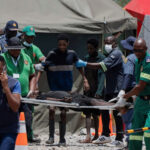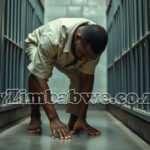The arrest of Prince Dubeko Sibanda, a former Member of Parliament for the Citizens Coalition for Change (CCC), at the Beitbridge border post has sparked outrage among opposition figures and human rights groups, who see it as another example of the Zimbabwean government’s crackdown on dissent.
Sibanda, who was recalled from parliament by the ruling ZANU-PF party through a controversial process, was reportedly on his way back to Zimbabwe from South Africa when he was apprehended.
The CCC, in a statement on X (formerly Twitter), condemned the arrest, calling it “the regime’s ongoing persecution of innocent citizens” and demanding Sibanda’s immediate release.
Award-winning journalist Hopewell Chin’ono echoed the condemnation, highlighting the timing of the arrest as particularly egregious.
“A Zimbabwean opposition leader and member of parliament, who was illegally removed from parliament through Mnangagwa’s constitutional violation charade, has been arrested at the Beitbridge border post. This arrest shows that Mnangagwa doesn’t give two hoots about SADC if he can do this while the leaders are still in Zimbabwe,” Chin’ono wrote on X.
Chin’ono further pointed out that the arrest is part of a broader pattern of repression, with over 100 pro-democracy activists detained in the past 62 days. He condemned the use of tactics such as torture, arbitrary arrests, abuse of the judiciary, and imprisonment.
“The United Nations has condemned the unprecedented crackdown and called for the release of all political prisoners. Sadly, SADC will simply look the other way,” Chin’ono said.
Gift Ostallos Siziba, a fellow CCC MP who was also recalled by ZANU-PF, expressed similar concerns on X.
“Honorable Prince Dubeko Sibanda has been arrested at the Beitbridge border post. The regime’s persecution of individuals it deems enemies of ZANU-PF continues,” Siziba wrote.
This is not the first time Sibanda has faced arrest. In August 2020, he was detained in Bulawayo for allegedly distributing face masks inscribed with the slogan “#ZanuPFMustGo.” He was later acquitted of the charges.
In April 2014, Sibanda was also arrested for allegedly drugging and raping a 17-year-old girl. However, he was acquitted of these charges as well.
The latest arrest comes just two days after Sibanda posted a controversial tweet with a photo of controversial businessman Wicknell Chivayo and Tanzanian President Samia Suluhu Hassan. The tweet, which accused President Hassan of “selling Zimbabwe’s freedom for US$500,000,” sparked widespread outrage.
Zimbabweans, let's be ready to meet @SADC_News sellouts like her in the streets of Hre. She sold our freedom for US$500 000. Let her know we hate what she did. We're suffering because of her ilk. pic.twitter.com/8zBnqZ2smo
— Prince Dubeko Sibanda (@DubekoSibanda) August 15, 2024
It is reported that the arresting officers indicated that the order to incarcerate Sibanda came from Harare, where he will face the charges.
Meanwhile, the United Nations Human Rights Office has joined calls for the release of over 200 activists detained in Zimbabwe ahead of the recent SADC summit.
“We at the U.N. Human Rights Office are concerned by reports of arrest, harassment and intimidation of human rights defenders and political activists in Zimbabwe, in the lead up to the SADC summit. We call for the immediate release of all those arbitrarily detained and for protection of civic space,” said UN Human Rights Office spokesperson Seif Magango.
“While freedom of expression is a fundamental right, it’s paramount to observe that the enjoyment of that freedom should not be at the expense of the freedom of your fellow citizens. Freedom of expression does not and cannot mean the right to remove a democratically elected government from office and to replace it with people or [a] party elected by nobody. The opposition has never held any peaceful demonstrations,” said Kazembe Kazembe, Zimbabwe’s home affairs minister.
The arrest of Sibanda, coupled with the broader crackdown on dissent, has raised serious concerns about the state of human rights in Zimbabwe. The international community is watching closely, with calls for the release of all political prisoners and the protection of civic space growing louder, but President Mnangagwa’s administration is hitting back, saying Zimbabwe is a sovereign state that cannot be told what to do by the United Nations or other states.











